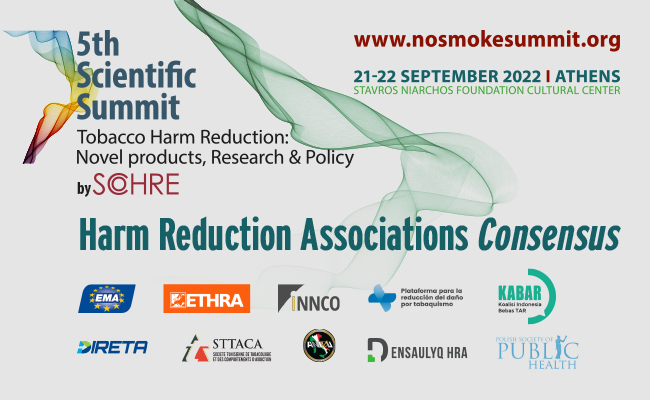SCOHRE took the lead in drafting and getting the endorsement of Supporting Associations to a Consensus paper as a result of the discussion held during the 5th Scientific Summit on Tobacco Harm Reduction, and in particular, at the session “THR challenges & prospect: From scientific evidence to people’s needs satisfaction”.
Read the full text below and download a pdf version here.
Harm Reduction Associations Consensus led by SCOHRE
Despite knowing the harmful health effects of smoking for decades, and implementation of smoking control efforts for decades, still more than 1 billion people globally smoke and more than 7 million die prematurely every year from smoking-related diseases. We believe that smoking control strategies should be reshaped to include harm reduction. Alternative lower risk products should be encouraged, besides the traditional smoking cessation and smoking prevention measures.
Nicotine has an addictive potential but plays a minor role in smoking related huge mortality. It is an addictive substance, but it has been used successfully in smoking control and smoking cessation as medication.
It is imperative to provide all stakeholders with science-based and balanced information on the effects of nicotine versus the detrimental effects of smoking!
Smoking cessation and prevention remain the two most impactful and cost-effective interventions in medicine. Healthcare and public health professionals need to continuously raise awareness to every smoker and to the population about the adverse effects of smoking. Yet, there is growing evidence that limiting the negative effects of smoking can be also achieved by tobacco harm reduction, i.e., with novel safer alternatives to cigarettes.
There is mounting evidence in the literature that tobacco harm reduction can help those who are not able to quit smoking. In an era of technological innovation, new approaches continuously emerge based on safer alternatives than cigarettes, for those smokers, who for various reasons cannot give up smoking completely. Where cessation repeatedly fails, switching to less harmful products will have a positive effect for many smokers.
We need to raise awareness on existing knowledge. Create more opportunities for the education of health policy experts, regulators, and general public to properly explain the benefits of harm reduction. Better informed patients lead to better outcomes. Better informed doctors and public health officials lead to better informed patients. Better informed politicians lead to more effective policies. Regulators and policymakers should make informed evidence-based decisions.
We believe that the generation of evidence should not be prevented. Therefore, we strongly believe that more research and publications are needed and that the newer products should be scientifically evaluated against combustible cigarettes!
We acknowledge that the debate on tobacco harm reduction is still facing a lot of opposition from some of the key actors, including policy and regulatory bodies. Nevertheless, we believe that more studies will cast out all doubt. We need openness and academic freedom to generate robust evidence and implement innovative public health policies.
There is a need to step up the efforts and benefit from the already existing solid expertise in many countries: sharing and publicizing the latest scientific data, identifying research gaps, independently verifying industry data, focusing on smokers (what are the needs of those who want to quit smoking, as well as how to effectively help those who are not willing to quit), sharing policy recommendations, evaluating interventions etc.
We believe creating a generic narrative and discourse that all nicotine products are equally harmful to cigarettes with respect to one’s health is misleading, and authorities should consider changing it.
Authorities have the obligation to inform citizens about the relatively lower risks that the newer products have vs the undoubtedly deadly cigarettes. The failure to inform the public on relative risks and to encourage cigarette smokers to switch to safer nicotine alternatives is a violation of consumer rights and constitutes negligence.
Rapporteur:
Solomon T. Rataemane – THR Expert, South Africa
Supporting Associations signing the Consensus:
- European Medical Association {EMA} – Manuel Pais-Clemente
- European Tobacco Harm Reduction Advocates {ETHRA} – Tom Gleeson
- International Network of Nicotine Consumer Organisations {INNCO} – Kim Dabelstein Petersen
- Platform for the Reduction of Harm due to Tobacco Consumption {Spain} – Fernando Fernández Bueno
- Indonesian Tar Free Coalition (KABAR) {Indonesia} – Amaliya Amaliya
- DIRETA {Brazil} – Alexandro Lucian
- Tunisian Society of Tobaccology and Addictive Behaviors {Tunisia} – Fares Mili
- Associazione Nazionale Consumatori Vaporizzatori Personali – ANPVU {Italy} – Carmine Canino
- Densaulyk Harm Reduction Association {Kazakhstan} – Gintautas-Yuozas Kentra
- Polish Society of Public Health {Poland} – Andrzej M. Fal

